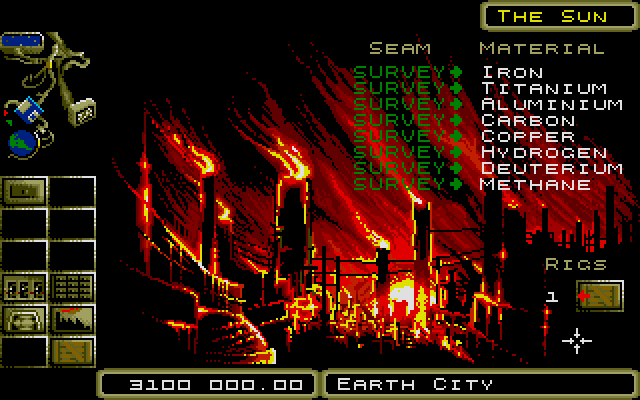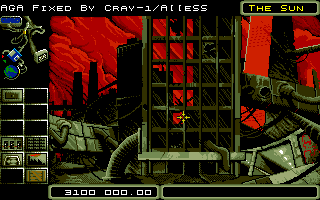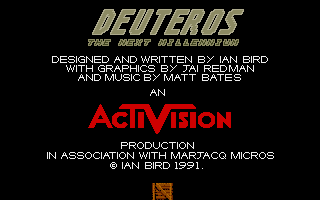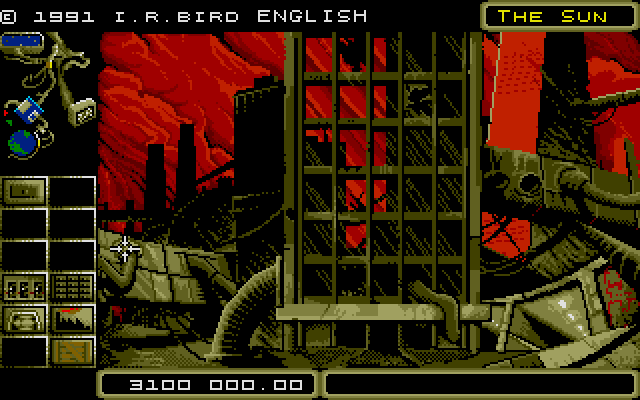Retro Replay Review
Gameplay
Deuteros: The Next Millennium offers a deep, methodical approach to space strategy that unfolds over multiple stages of technological and territorial expansion. You begin with the ruins of a post-war Earth, managing a small pool of survivors who must be assigned to research, production, or military training. This initial resource juggling is deceptively simple, but the pace quickly picks up as you unlock new technologies and begin to plan your first forays beyond Earth’s atmosphere.
(HEY YOU!! We hope you enjoy! We try not to run ads. So basically, this is a very expensive hobby running this site. Please consider joining us for updates, forums, and more. Network w/ us to make some cash or friends while retro gaming, and you can win some free retro games for posting. Okay, carry on 👍)
The core loop revolves around research, mining, production, and colonization. Your scientists research increasingly advanced concepts, which then require new materials harvested from nearby asteroids or newly settled worlds. Production teams convert these raw materials into spacecraft components, orbital factories, and eventually automated mining drones. It’s a satisfying chain of cause and effect, demanding careful prioritization: invest too heavily in research and you’ll starve production, overbuild military craft and your economy will stall.
Colonization introduces a strategic map that spans the inner and outer solar system, each zone richer in rare minerals than the last. Establishing an orbital factory around Mars or Ganymede feels like a genuine milestone—supply lines lengthen, transit times increase, and you must safeguard convoys against random events. Better-equipped ships with automated systems ease the micro-management burden, but only after substantial investment. Veteran players will appreciate the intricate balancing act; newcomers may find the learning curve steep but ultimately rewarding.
Graphics
Deuteros presents its universe through stark, predominantly static screens accentuated by minimal animations. Spacecraft, orbital facilities, and planetary surfaces are depicted with simple line art and muted color palettes that evoke a cold, industrial future. While the visual fidelity is limited by early ’90s hardware, the design leans into its strengths: clear icons, easy-to-read status panels, and distinct color coding for resources and alerts.
The absence of background music during play is notable—your ears are filled instead with mechanical whirrs, beeps, and the occasional launch countdown. This austere soundscape reinforces the game’s atmosphere of lonely, measured progress. Some players may miss an orchestral score, but the minimalist effects serve a practical purpose: they focus attention on the clockwork complexity of your burgeoning space empire.
The user interface relies on straightforward point-and-click mechanics, with context-sensitive menus that expand as you research new functions. There’s no drag-and-drop flair here—just a hierarchy of icons and data screens. While modern gamers may balk at the lack of drag-and-drop or hotkey flexibility, the UI remains surprisingly intuitive once you internalize its layout. Clarity and efficiency, rather than flash, define Deuteros’ presentation.
Story
Set in the aftermath of a global conflict that devastated Earth’s infrastructure, Deuteros weaves a tale of survival through silent storytelling and strategic milestones. There are no cutscenes or voiced narrations—your narrative emerges from mission briefings, research logs, and the gradual unlocking of new star systems. This minimalist approach places the onus on players to imagine the broader geopolitical landscape and the stakes of interplanetary colonization.
Each technological breakthrough feels like a narrative chapter: discovering the fundamentals of spaceflight, mastering orbital manufacturing, and perfecting robotic mining drones each mark your civilization’s comeback. The sense of a domino effect in human achievement—science begets industry, industry enables exploration, exploration uncovers new resources—creates an emergent storyline that resonates more deeply than a scripted plot might.
Occasional text alerts hint at wider galactic politics and potential rivalries, laying the groundwork for a sequel—or for your own imagined conflicts. While Deuteros never thrusts you into diplomatic negotiations or direct PvP skirmishes, the implicit tension of resource scarcity and far-flung supply lines provides enough narrative thrust to keep dedicated strategists invested in the “what happens next” question.
Overall Experience
Deuteros: The Next Millennium stands as a testament to the depth that early space strategy games could achieve with modest technology. The lack of flashy presentation is more than made up for by the layered systems of research, production, and logistics. If you’re drawn to macro-scale planning and don’t mind a slower, more deliberate pace, you’ll find hours of rewarding gameplay as you expand from a single orbital factory to a sprawling interplanetary network.
That said, Deuteros isn’t for everyone. Its steeper learning curve and austere audiovisuals may deter those accustomed to modern conveniences like drag-and-drop interfaces or dynamic 3D graphics. The game demands patience and a willingness to embrace its spreadsheet-like depth, but the payoff is a genuine sense of authorship over your own slice of the solar system.
In an era where many strategy titles prioritize real-time action or cinematic story beats, Deuteros offers an unhurried, cerebral alternative. Its design philosophy—complex systems revealed gradually, minimal hand-holding, and a focus on interlocking mechanics—has influenced countless successors. For players eager to trace the roots of 4X strategy and experience the birth of large-scale space empires in gaming history, Deuteros remains an essential and deeply satisfying journey.
 Retro Replay Retro Replay gaming reviews, news, emulation, geek stuff and more!
Retro Replay Retro Replay gaming reviews, news, emulation, geek stuff and more!









Reviews
There are no reviews yet.